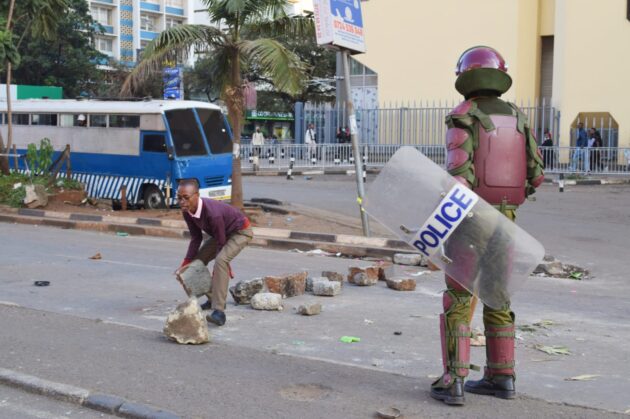
Reform group demands end to use of live ammunition in neighbourhoods » Capital News
NAIROBI, Kenya, Jul 15 – The Police Reforms Working Group (PRWG), a coalition of civil society organizations and legal watchdogs, has called on the Executive to “unequivocally uphold the Constitution, halt the use of live ammunition in residential areas, and initiate deep policy changes to protest policing.”
The group condemned the government’s heavy-handed response to the July 7 Saba Saba demonstrations, accusing security forces of widespread human rights violations, unlawful killings, and systemic impunity.
The statement was endorsed by over 20 national and grassroots organizations, including Amnesty International Kenya, Kenya Human Rights Commission (KHRC), International Commission of Jurists (ICJ Kenya), Women Empowerment Link, HAKI Africa, Transparency International Kenya, and the Federation of Women Lawyers (FIDA-Kenya).
It follows an alarming surge in police violence that left at least 38 people dead—including two children and four women—and hundreds more injured or arrested across more than 20 counties.
The July 7 protests turned deadly after reports emerged of police opening fire on unarmed civilians, including in densely populated towns in Kajiado County such as Ngong, Rongai, Kitengela, and Kiserian.
PRWG said Tuesday that its investigators documented extrajudicial executions, disappearances, and arbitrary arrests, linking the violence to unmarked vehicles carrying heavily armed men suspected to be police officers or affiliated security agents.
“A fact-finding mission has reviewed video footage and collected multiple eyewitness accounts of grave violations from Ngong and nearby towns in Kajiado County, including Rongai, Kitengela, and Kiserian,” PRWG stated.
“These include the use of live ammunition against unarmed civilians, extrajudicial executions, disappearances, and unlawful arrests.”
The lobby added that eyewitnesses described scenes of terror, with uniformed and plainclothes officers allegedly discharging live ammunition without warning.
In several instances, ambulances were observed following the unmarked vehicles, with injured civilians whisked away to undisclosed locations—a development PRWG called “deeply disturbing and in urgent need of explanation.”
Despite clear constitutional and statutory restrictions on police use of force, the group noted that the National Police Service and the Inspector General have failed to identify the operatives involved or provide any accountability for their actions.
“To date, the Inspector General of Police has not identified those operating the unmarked Subarus, their institutional affiliation, or the legal justification for their actions,” the lobby said.
“There has also been no explanation about who owns the ambulances, why they were deployed alongside the armed units, or the destination of those they transported.”
IPOA oversight
As of the time of the statement, the lobby group said it remains “unclear” whether the commanders in charge of deployment have reported to the Independent Policing Oversight Authority (IPOA) as required by law.
They noted that the lack of transparency continues to erode public trust and intensify fears of state-sponsored violence and enforced disappearances.
The group visited survivors and bereaved families, documenting severe injuries, including gunshot wounds and machete cuts.
In one Nairobi hospital alone, PRWG reported that 21 patients were receiving treatment for bullet injuries.
The group also documented at least one case of sexual violence against a female protester.
Among the dead were 12-year-old Bridget Njoki, who was shot while watching television, and Julia Njoki, who died while in police custody under unclear circumstances.
“Those who died during and after Saba Saba Day are not just numbers. They are fathers, mothers, young people, and children whose lives have been ripped from their families. For the survivors, many have injuries that forever change their lives,” the group said.
Terrorism charges
The crackdown has extended into the judicial system, with over 500 protesters facing charges across the country.
In a particularly concerning development, 37 individuals—including a sitting Member of Parliament—have been charged with abetting terrorism.
Dozens of others face charges ranging from murder to unlawful assembly and robbery with violence.
PRWG raised alarms over what it called a growing pattern of using serious capital charges to criminalize protest, warning that such actions violate constitutional protections on peaceful assembly and due process.
The coalition urged the Office of the Director of Public Prosecutions (ODPP) to act in the public interest and avoid “abuse of the legal process,” citing their own prosecutorial guidelines and the Inter-Agency Framework on Counterterrorism.
They also urged the Independent Policing Oversight Authority (IPOA) to expedite investigations into all thirty-eight documented deaths and 500+ injuries, release findings publicly, and intervene to preserve evidence in affected areas.
Additionally, they called on Parliament to exercise robust oversight over security agencies and safeguard civil liberties.
PRWG reiterated that while concerns about criminal infiltration of protests are valid, the state bears the responsibility to distinguish between peaceful demonstrators and actual offenders—without resorting to collective punishment.